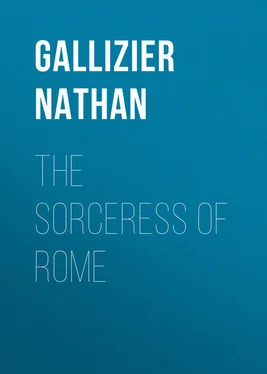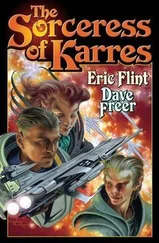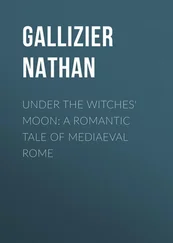Nathan Gallizier - The Sorceress of Rome
Здесь есть возможность читать онлайн «Nathan Gallizier - The Sorceress of Rome» — ознакомительный отрывок электронной книги совершенно бесплатно, а после прочтения отрывка купить полную версию. В некоторых случаях можно слушать аудио, скачать через торрент в формате fb2 и присутствует краткое содержание. Жанр: foreign_antique, foreign_prose, на английском языке. Описание произведения, (предисловие) а так же отзывы посетителей доступны на портале библиотеки ЛибКат.
- Название:The Sorceress of Rome
- Автор:
- Жанр:
- Год:неизвестен
- ISBN:нет данных
- Рейтинг книги:4 / 5. Голосов: 1
-
Избранное:Добавить в избранное
- Отзывы:
-
Ваша оценка:
- 80
- 1
- 2
- 3
- 4
- 5
The Sorceress of Rome: краткое содержание, описание и аннотация
Предлагаем к чтению аннотацию, описание, краткое содержание или предисловие (зависит от того, что написал сам автор книги «The Sorceress of Rome»). Если вы не нашли необходимую информацию о книге — напишите в комментариях, мы постараемся отыскать её.
The Sorceress of Rome — читать онлайн ознакомительный отрывок
Ниже представлен текст книги, разбитый по страницам. Система сохранения места последней прочитанной страницы, позволяет с удобством читать онлайн бесплатно книгу «The Sorceress of Rome», без необходимости каждый раз заново искать на чём Вы остановились. Поставьте закладку, и сможете в любой момент перейти на страницу, на которой закончили чтение.
Интервал:
Закладка:
"Had he horns?" shouted the Lord of Bracciano.
"Or a cloven hoof?" cried Oliverotto.
"What was he like?" sneered a third.
Theodora turned upon her questioners, a dash of scorn in her barbed reply.
"I speak of a man, not reptiles like you – you all!"
"Mercy, oh queen, mercy!" begged the apoplectic poet, amid the noisy clamour of his jeering companions. But heedless of their jabbering tongues Theodora continued earnestly:
"Not such men as the barons of Rome are pleased to call themselves, cowardly, vicious, – beasts, who believe not in God nor the devil, and whose aim in life is but to clothe their filthy carcass in gaudy apparel and appease the cravings of their lust and their greed! I speak of a man, something the meaning of which is as dark to you as the riddle of the Sphinx."
The company gazed at each other in mute bewilderment.
Theodora was indeed in a most singular mood.
"Are we not at the Court of Theodora?" shouted the Lord of Bracciano, who was experiencing some inconvenience in the feat of embracing with his short arms the two women between whom he was seated. "Or has some sudden magic transported us to the hermitage of the mad monk, who predicts the End of Time?"
"Nay," Benilo spoke up for the first time since Theodora's rebuke had silenced him, "perhaps our beautiful Queen of Love has in store for her guests just such a riddle as the one the Sphinx proposed to the son of Iokasté – with but a slight variation."
The illiterate high-born rabble of Rome did not catch the drift of the Patrician's speech, but the pallor on Theodora's cheeks deepened.
Roxané alone turned to the speaker.
"And the simile?" she asked in her sweet siren-voice, tremulous with the desire to clash with her more beautiful rival.
Benilo shrugged his shoulders, but he winced under Theodora's deadly gaze.
"The simile?" he replied with a jarring laugh. "It is this, that incest and adultery are as old as the Athenian asses, that never died, and that the Sphinx eventually drowned herself in the Aegean Sea."
Theodora made no reply, but relapsed into her former state of thoughtfulness. As she turned from Benilo, her eyes met those of Roxané, and again the two women flashed defiance at each other.
Again the laughter of the revellers rose, louder than before.
"By the Cross," shouted the poet, "the Queen of Love will take the veil."
"Has she chosen the convent, whose nuns she will cause to be canonized by her exemplary life and glorious example," jeered Roxané.
"We shall sing a thousand Aves and buy tapers as large as her unimpeached virtue!" cried another of the women.
"I fear one nunnery is damned from chapel to refectory," growled Benilo, keeping his eyes on the floor, as if fearful of meeting those he instinctively felt burning upon him.
"Silence!" cried Theodora at last, stamping her foot on the floor, while a glow of hot resentment flushed her cheeks. "Your merriment and clamour only draws the sharper line between you and that other, of whom I spoke."
Roffredo looked up with a smile of indolence.
"And who is the demi-god?" he drawled lazily.
She measured him with undisguised scorn and contempt.
"The name! The story!" bellowed several individuals, raising their goblets and half spilling their contents in their besotten mood.
In a strange voice, melodious as the sound of Æolian harps when the night wind passes over their strings, amid profound silence Theodora related to her assembled guests the incident of the runaway steeds in which she had so prominently figured, the chariot having been her own, – the occupant herself. She omitted not a detail of the stranger's heroic deed, passing from her own thrilling experience to Vitelozzo's assault upon one of the New Vestals, and his discomfiture at the hand of him who had saved her life.
"And while your Roman scum hissed and hooted and raised not a finger in the girl's defence, her rescuer alone braved Vitelozzo's fury – I saw him whisper something into the ruffian's ear and the mighty lord skulked away like a frightened cur. By heaven, I have seen a man!" the Queen of the Groves concluded ecstatically, disdaining to dwell on her own rescue.
For a lingering moment there hovered silence on the assembly. Gradually it gave way to a flutter of questions.
"Who is he?" queried one.
"What is he like?" shouted another.
Theodora did not heed the questions. Only her lovely face, framed by hair dark as the darkest midnight, had grown a shade more pale and pensive.
Suddenly she turned to the last questioner, a woman.
"What was he like?" she replied. "Tall, and in the prime of manhood; his face concealed by his vizor."
The woman sighed amorously. The men nodded to each other with meaning glances. The danger of the convent seemed passed.
Benilo, who during Theodora's narrative had proven an ideal listener, of a sudden clenched his fist and gazed round for the harper, who sat in a remote corner of the hall.
Another moment's musing, then the Chamberlain ground his teeth together with the fierce determination to carry out at all hazards, what he had resolved in his mind. Theodora herself was playing into his hands.
"Do you know this incomparable hero, this modern Theseus?" he drawled out slowly and with deliberate impudence, addressing the Queen of the Groves.
Theodora's gaze was sharp as steel.
"What is it to you?" she hissed.
Benilo shrugged his shoulders disdainfully.
"Nothing whatever! I also know him!"
There was something in his tone, which struck the ever-watchful ear of Theodora like a danger-knell.
"You know him?" echoed a chorus of voices from every part of the great hall.
He waved back the eager questioners.
"I know him!" he declared emphatically, then he was silent.
Theodora seemed to have grown nervous.
"Are you serious?"
"Never more so!" Benilo replied, with a slight peculiar hardening of the lips.
"Is he a Roman?" cried a voice.
"All Romans according to our fair Queen's judgment, are curs and degenerates," Benilo drawled insultingly.
Theodora nodded.
"Even so," she replied coldly.
"This demi-god, however, is also slightly known to you," the Chamberlain continued, now fairly facing the Queen of Love, "even though he has not yet found his way to your bowers."
Theodora winced.
"Why do you taunt me?" she flashed back angrily.
Benilo heeded her not. Instead of replying, he addressed himself to the company, speaking in a dry, half-bantering tone, while Theodora watched him like a tigress.
"Once upon a time, the Queen of Love boasted that mortal man did not breathe who would resist her charms. Now there is at this hour one man here in Rome, whom even the matchless Theodora dare not summon to her circle, one man before whose 'No' her vain-glorious boast would break like a bubble, one man whose soul she may not sap and send to hell! And this one man is even the hero of her dreams, her rescuer, – the rescuer of a maiden of spotless virtue, the vanquisher of a giant! Do I speak truth, divine Theodora?"
Those who watched the expression on the face of the Queen of the Groves marvelled alike at Benilo's audacity and the startling absence of a passionate outburst on the part of the woman. And though the blood seethed through Theodora's veins, the sudden change of front on Benilo's part seemed to stagger her for a moment. It was a novel sensation to see the man who had heretofore been like clay in the moulder's hands now daring to flout her openly and to hold up her wounded pride as a target for the jests of those present. It was a novel sensation, to find herself publicly berated, but the shaft sank deep. Theodora's eyes flashed scorn and there was something cruel in her glances. Benilo felt its sting like a whiplash. His nerves quivered and he breathed hard. But he had gone too far to recede. His spirit had risen in arms against the disdain of the woman he loved, – loved with a passion that seemed to have slept in a tomb for ages and suddenly gathered new strength, like a fire kindled anew over dead ashes.
Читать дальшеИнтервал:
Закладка:
Похожие книги на «The Sorceress of Rome»
Представляем Вашему вниманию похожие книги на «The Sorceress of Rome» списком для выбора. Мы отобрали схожую по названию и смыслу литературу в надежде предоставить читателям больше вариантов отыскать новые, интересные, ещё непрочитанные произведения.
Обсуждение, отзывы о книге «The Sorceress of Rome» и просто собственные мнения читателей. Оставьте ваши комментарии, напишите, что Вы думаете о произведении, его смысле или главных героях. Укажите что конкретно понравилось, а что нет, и почему Вы так считаете.












